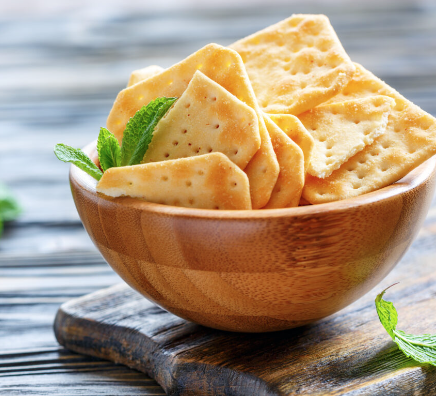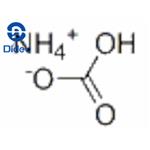Can Ammonium bicarbonate be used as a food additive?
Apr 9,2024
Description
Ammonium bicarbonate is a clear white crystalline solid with a faint ammonia smell. It slowly degrades the environment into ammonia, carbon dioxide, and water. Because ammonia is naturally released during the decomposition of proteins and related substances, some insects, including the olive fly, use the smell of ammonia to guide them to food and to stimulate eating.
Uses
Ammonium bicarbonate (ABC) is a vital raising agent for the biscuit and cracker industry, and bakers also use it in some strongly flavored products, such as gingerbread. ABC decomposes on heating at 60°C in a temperature-driven reaction, releasing carbon dioxide, ammonia, and water vapor. ABC offers significant technical benefits, as it is used for rapid, early expansion in the oven. Since ABC does not start acting before the oven, it means that products do not gas when the dough is mixed or standing, which can be vital during plant breakdowns. Unlike sodium bicarbonate, which leaves a residue of alkaline sodium carbonate, ammonium bicarbonate leaves no residue when it decomposes by heat. It, therefore, has no effect on the pH of the baked product. However, if there is more than 5% moisture in the baked product, the ammonia gas will dissolve in this water and impart an ammoniacal flavor to the product. For this reason, ammonium bicarbonate is used only in low-moisture products such as crackers[1].

Ammonium bicarbonate, a natural chemical, has a faint ammonia smell because it slowly decomposes into ammonia, carbon dioxide, and water. As an active pesticide ingredient, it acts as an insect-feeding attractant. In its first approved end-use products, ammonium bicarbonate is combined with two other active ingredients to control olive flies in olive orchards. When used according to label directions on products, this active ingredient is not expected to harm people or the environment.
Mechanism of Action
The first pesticide end products containing ammonium bicarbonate as an active ingredient are traps that enclose a matrix containing three active ingredients: olive fly mating pheromone, which attracts male olive flies from a distance; ammonium bicarbonate as a source of ammonia, which attracts the flies and stimulates them to eat; and lambda-cyhalothrin, which kills insects that ingest it. These traps are dispersed throughout the olive orchards. Ammonium bicarbonate (NH₄HCO₃) has been shown to contribute, promote, and speed up acrylamide formation in baked products. A proposed mechanism is that NH₄HCO₃ fragments sugars, forming the highly reactive glyoxal and methylglyoxal species, which can react with asparagine, thereby increasing acrylamide levels[2].
Safety
No risks to humans are expected from approved uses of ammonium bicarbonate as an active pesticide ingredient. The substance is approved as a food additive by the Food and Drug Administration (FDA) and as an inert pesticide ingredient by EPA. No toxic endpoints have been identified. Using ammonium bicarbonate as an active pesticide ingredient will lead to negligible increases in human exposure to ammonium bicarbonate and ammonia based on current uses.
Current status
European Union: Ammonium carbonates (which include ammonium bicarbonate) have been allowed for use as “Others” in the European Union since 2001. “Others” include acid, acidity regulators, anti-caking agents, anti-foaming agents, bulking agents, carriers and carrier solvents, emulsifying salts, firming agents, flavor enhancers, flour treatment agents, foaming agents, glazing agents, humectants, modified starches, packaging gases, propellants, raising agents, and sequestrants.
Ammonium bicarbonate is approved as a food additive in the European Union, Australia, and New Zealand.
Japan: Ammonium bicarbonate is not currently listed as an approved agricultural chemical for organic agricultural products in Japan.
Canada: Canada allows the use of ammonium carbonate (aka ammonium bicarbonate) as bait in insect traps for cherry fruit flies and for monitoring purposes only. It cannot be in contact with crops or soil. In fact, they ban all ammonia products for use in crop nutrition, including “… anhydrous ammonia, aqua ammonia, ammonium nitrate, ammonium phosphate, ammonium sulfate, and ammonium soaps.” However, Canada does not list ammonium bicarbonate in their short list of specific ammonia products. This may be because the Canadian-listed ammonia compounds are quite toxic, whereas ammonium bicarbonate has been recognized as GRAS by the FDA since 1983 for use as a leavening agent, a pH control agent, a dough strengthener, and a texturizer in foods for human consumption.
Codex Alimentarius: Ammonium bicarbonate is not currently listed as approved for use in the production of organic foods. However, it does approve: “Slurry or urine. If not from organic sources, it needs to be recognized by the inspection body. Preferably after controlled fermentation and/or appropriate dilution. “Factory” farming sources are not permitted.
References:
[1] Streekstra, H. and Andrew J. Livingston. “Acrylamide in bread and baked products.”Breadmaking (Third Edition) (2020): 289-321.
[2] Penfield, M. P. and A. Campbell. “CHAPTER 18 – LEAVENING AGENTS.”Encyclopedia of Food Sciences and Nutrition (Second Edition) (2003): 3485-3490.
- Related articles
- Related Qustion
- What does Ammonium bicarbonate do? Dec 22, 2023
Ammonium bicarbonate is an important bulking agent in the biscuit and cracker industry, and is also used by bakers in some strong-flavoured products such as gingerbread.
Supplementation with pyridoxal 5'-phosphate monohydrate can synthesize neurotransmitters such as dopamine and serotonin, maintaining a healthy nervous system.....
Nov 4,2025Biochemical EngineeringButyl Isocyanate is a colourless liquid, it may polymerize due to heating. Decomposes on burning.....
Jan 26,2025Organic ChemistryAmmonium bicarbonate
1066-33-7You may like
Ammonium bicarbonate manufacturers
- Ammonium bicarbonate
-

- 2025-12-02
- CAS:1066-33-7
- Min. Order:
- Purity: 0.99
- Supply Ability:
- Ammonium bicarbonate
-

- $0.00 / 25KG
- 2025-12-02
- CAS:1066-33-7
- Min. Order: 25KG
- Purity: 98%min
- Supply Ability: 30tons/month
- Ammonium bicarbonate
-

- $0.00 / 25kg
- 2025-12-01
- CAS:1066-33-7
- Min. Order: 1kg
- Purity: 99%
- Supply Ability: 10000KGS






